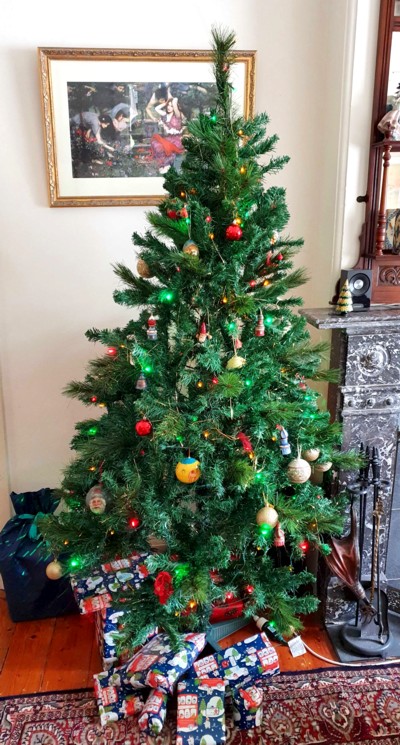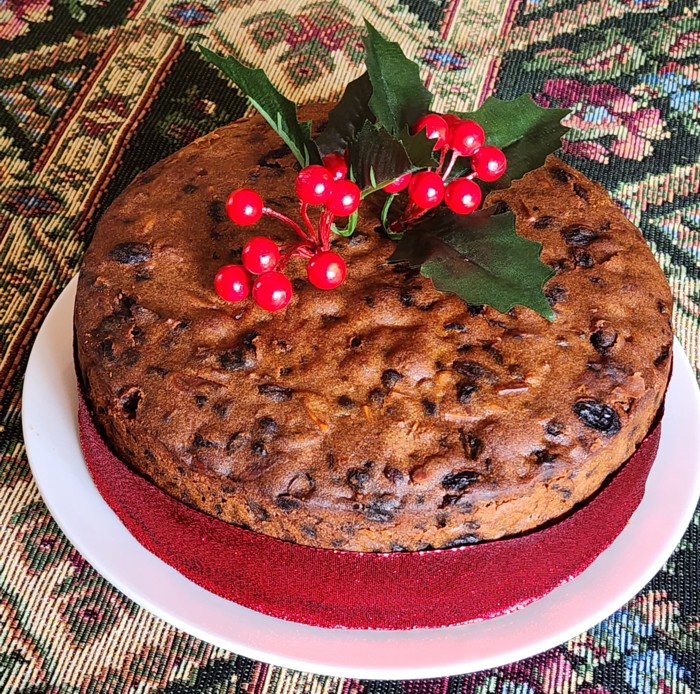Last year it was with much optimism that I wished you all a happy festive season and a prosperous 2023, after those anni horribiles 2021 and 2022.
And except for the usual minor disasters it generally met expectations. We got to do some more travel both domestic and overseas (if you are interested, click here and scroll down to Travel) and enjoyed the company of friends and family.
Now we are looking forward to more time with family over the festive season and 2024.
Those of you who read last year's message may find some of the following familiar.
In the past I've expressed concern about a growing movement to remove Christianity from the 'festive season' in recognition of multicultural Australia.
As my family, friends and readers know, I find religion in all its facets fascinating and I'm happy for people to believe whatever they like in the metaphysical realm, provided that they don't demand that others share those beliefs. And although I'm no longer a Christian I recognise that Christianity, more than any other modern religion, has enriched the Australian culture in innumerable ways, just as, I expect, other great religions will do in the future.
But this needs to be an additive process. Not subtractive. The human imagination is evidently infinite, so the old need not make way for the new. Thus, we still read or refer to Homer, Aesop, Aristotle; Herodotus and Vergil, despite having long since rejected their gods. I have no problem with children learning of the 'Tortoise and the Hare' or about the adventures of Odysseus or about the Wooden Horse of Troy. Plato - Socrates - remains the father of philosophy.
So I'm more than content with our traditional Christmas, this uniquely Australian blend of cultural traditions, celebrated in the heat of summer. I'm happy for school kids to perform in nativity plays. I'm happy to go to Church with friends and family. And I'm happy to play Christmas Carols at home and sometimes sing them with others in a park or around a table. I haven't found their effect on my children to be deleterious, any more than repeatedly watching 'The sound of Music' or, when a little older, attending a performance of Oedipus Rex. Indeed, without a basic understanding of Christianity or the pre-Christian ancients much of our culture becomes obscure.
Like many Australians I'm an immigrant. I arrived as an infant in 1948 with my parents. At that time, I had no choice in the matter. But since then, I've lived overseas on two extended occasions and I still have that option. Yet I've chosen to live in Australia because I've come to like this great society building project and to be a part of our uniquely Australian way of life. Celebrating Christmas in summer has become for me part of what it is to be uniquely Australian.
So, I'm inclined to say to new arrivals or to local 'politically correct' killjoys who object: "Try embracing our chosen country's rather unique traditions and ways. You may come to love them, as I have. Celebrating Christmas doesn't stop us holding our own religious beliefs or from remembering and integrating our previous cultural traditions, in addition. It's richer that way."
The origins of Christmas
In Northern Europe the sun appears for only a few hours in midwinter. In midsummer the opposite is true; the night is very short. After midwinter’s night the sun begins to return and a new year is born. This is cause for celebration. For example, the ancient god Woden, after whom we name Wednesday, was celebrated at the midwinter celebrations; at which rebirth was the central theme in pre-Christian times.
Evergreens, fir trees, holly, mistletoe, decorated these festivities and the feast. Gift giving traditions, together with seasonal songs and music enlivened the feast.
Early Christians had misgivings about bacchanalian feasts and celebrations. But they needed to overthrow the pre-existing pagan beliefs. Ever pragmatic, since the theme of the mid-winter festivals was rebirth an obvious strategy was to establish the celebration of Christ’s birth to correspond with it; and to add some corroborative detail, intended to give artistic verisimilitude to an otherwise bald and unconvincing narrative in the form of additional myths and music.
But by the 16th century biblical scholars pointed out that Jesus had not been born at Christmas time and the whole event was of dubious provenance: it should be considered a pagan throwback. For a period, Christmas was banned in Northern Europe and ceased to be a holiday in many countries.
When Dickens wrote ‘A Christmas Carol’ he was in part attempting to revive a festival that had seen better days.
Christmas received a considerable boost in the 20th century when it became central to the new arts of marketing and retailing; as consumption, rather than production, became the driver of the industrial and post-industrial economies. Now Christmas creates peak sales and is the height of the retail year. A failed Christmas sales period is a failed economy.
This new Christmas was heralded in the 1931 by the Coca-Cola Company when Christmas cheer became the centre of one of their most successful marketing campaigns; giving us the new red and white Santa to replace the old ‘Green and fur’ Father Christmas or St Nicholas of earlier times.

The Christmas Tree
A Christmas Tree remains a symbol of these pre-Christian traditions and half a decade ago I bought a new one. The old one was thirty years old. I inherited it from my parents.
It was under that tree that my infant children and their cousins played, and collected their presents, when we visited my parents at Christmas. But alas, it had become very shabby. Those same children mocked it as a sad shadow of the one of distant memory; when it was vast and glittering; towing above them; a thing of wonder.
Eventually, like changing a car, I went out and with some enthusiasm bought a new Tree. In the same spirit I refreshed the tree decorations; saving only those with sentimental value; or that could still pass for new.

2021 tree with a few of the family gifts wrapped and ready
The big blue one is from Emily - ordered in Germany - but I correctly guessed sourced locally - it clinked!
Last year the tree remained in its box and is there still, as our local grandchildren are now too old to be thrilled about decorating it.
It awaits another generation.
Family Traditions
There was a time when I would not have had an artificial tree.
When we were very young our father would arrive home magically with a six-or-seven-foot branch from a fir tree. This would be stood in a large plant pot then ‘chocked- in’ with blocks of wood then sand to hold it vertical. A branch is always asymmetric and the lesser side was turned to the wall.
The whole family would decorate it.
Daddy’s job was the lights. Before commercial lights were available; or perhaps when they were too expensive; he made the string of lights by soldering little screw sockets, that took small 6V globes of the kind used in radios to illuminate the dial, to lengths of wire. Around each bulb, coloured cellophane was held with a little rubber band. To avoid electrocution, or fire, these ran to a low voltage transformer in a box, also home-made.
Many decorations were hand made too: from wool; paper; cardboard or papier-mâché. Handfuls of popcorn or lollies were wrapped in coloured cellophane or coloured crepe paper. Paper ropes, made by repeatedly folding two paper streamers together; complimented precious commercial decorations: tinsel and fragile balls of eggshell thin glass.
When commercial coloured ‘acorn’ lights became available a new ritual arose: finding the bulb that had blown. This involved using a spare bulb, that was believed to be working, to replace in sequence each bulb in the string until the lights came on again.
As Peter and I got older it was our job to harvest the fir tree branch, which would become our Christmas tree, from the bush. This required rope and a saw and our combined aesthetic, climbing and sawing skills. I have a photograph somewhere of one such branch being dragged up the hill by our dog, Blacky, in harness.
When the 'bush' became a park, self-harvesting became (more?) illegal. Commercial growers stepped in and soon it was ‘little America’ with Scouts and other charities distributing the soon to be dead, purpose grown, dense, symmetrical trees that now litter the pavements every year; and become carbon dioxide or land-fill a few days after Christmas.
Later when the fun, and investment of pre-TV holiday time, in finding our own tree and making our own decorations was gone, we reluctantly acknowledged that the tree is symbolic and could be artificial. We consoled ourselves with the knowledge that an artificial tree is almost endlessly reusable; saving a vast diversion of rural production, conspicuous consumption and unnecessary garbage generation.
So, when I put up and light a Christmas tree I find myself contemplating the ideas that hang upon it with each colourful bauble.
The tree represents tens of thousands of years of accumulated tradition and culture on which hangs: a green Father Christmas for its pre-commercial past; an elephant for the ancient traditions; little angels for religions past and present; a bell and gold star that evoke my parents and my own childhood. Now the sparkling baubles recall our children and theirs.
For many Australians this is a time of tradition; when we remember our European and Christian or perhaps other religious heritage. It’s about family and ancestry and the ghost of lost traditions and beliefs. It's why I want black pudding for breakfast on Christmas Day and a good malt a little later; struggle with haggis when in Scotland; and like a pint of Guinness or Newcastle Brown as appropriate.
On one side of our family gifts are distributed on Christmas Eve as in Northern Europe. On the other they are distributed on Christmas day. We all celebrate Christmas with Ham and Turkey and cake and pudding and mince pies and Christmas carols; in the middle of the Australian summer; even when most of my extended family are not even practicing Christians.
A minor tradition, for me, is Christmas baking:

One of four 2023 Christmas cakes - I did my annual cook-a-thon again this year - in mid November
Fruit cakes mature with age - so they're sitting there. I may, or may not, make marzipan and fondant icing, for one or more of them
Probably not - its all sugars, raw egg and almonds
As Tim Minchin sings in White Wine in the Sun Christmas is a time for family. So, with one daughter in Germany and the extended family far-flung, the lyrics have a special meaning for me: I really like Christmas - It's sentimental, I know.
|
And if my baby girl |
A so to my family, friends and readers (as Dickens' reformed Scrooge declared on Christmas morn).: 'A merry Christmas to everybody! A happy New Year to all the world.

